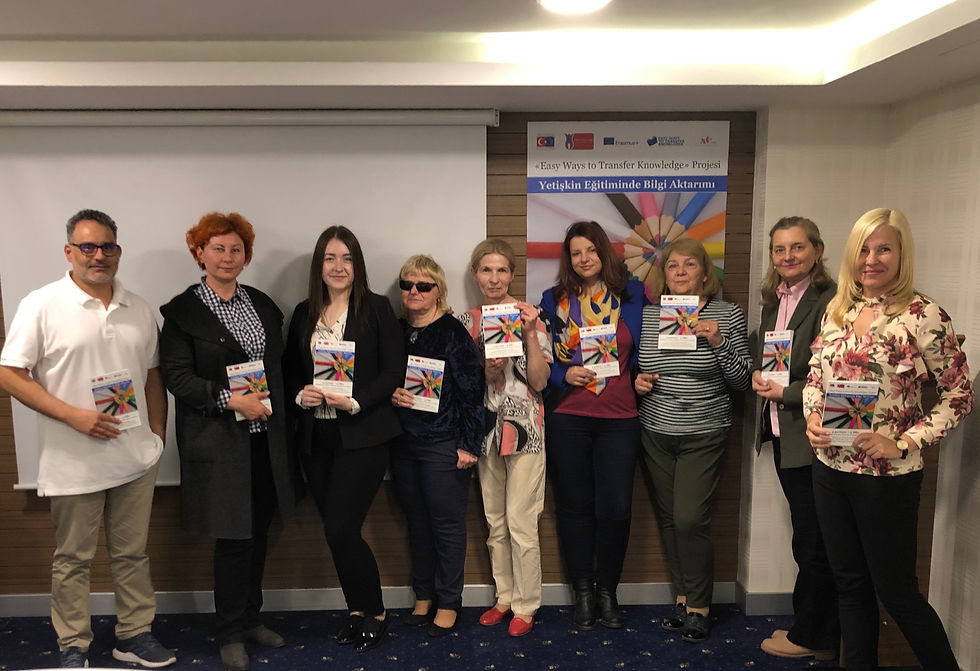EASY WAY TO TRANSFER KNOWLEDGE
Erasmus+ Strategic partnership
Partners:
🇱🇻 Latvia - Ecological Future Education
🇧🇬 Bulgaria - Balkanska Agenciya za Ustoychivo Razvitie
🇵🇱 Poland -Śląska Fundacja Wspierania Przedsiębiorczości
🇷🇴 Romania - Asociatia InitiativaCetatenilorSeniori
🇹🇷 Turkey - İstanbul Avrupa Araştırmaları Derneği

@ProjectEasyKnowledge
Education is a team work; however, the main work is done by educators who create a purposeful, systematic and coordinated learning process in using correct training methods. Through the activities of this project we plan to improve educators’ skills and competences on how to adapt ways of training when working with low skilled people. The project involves organising training activities for educators from partner organizations, promoting easy ways to transfer knowledge, and it focuses on creativity in education.
The aim of the project is to find out recommendations for easy way to transfer knowledge that could be used when working with low skilled adults, long-term unemployed persons, and also refugees and people with language perception difficulties.
The objectives of the project is to enhance educators’ knowledge for work with low skilled adults by providing support and suggestion Handbook – 'Easy ways to transfer knowledge', sharing good practices of creative education, and strengthening cooperation and networking between organizations.
The results of the project: Handbook for educators –Easy ways to transfer knowledge. Objective of the Handbook is to inform educators about training approaches, to improve their skills and competences in relation to adult training.
Available in six languages:
Latvian
English
Bulgarian

First transnational project meeting in Romania



First transnational project meeting in Romania

Second transnational project meeting in Turkey



Second transnational project meeting in Turkey

Third transnational project meeting in Poland



Third transnational project meeting in Poland

Educators training in Bulgaria



Educators training in Bulgaria

Final transnational project meeting in Latvia



Final transnational project meeting in Latvia
Polish
Romanian
Turkish
First transnational project meeting - Romania
During the meeting partners had the chance to meet in person and create stronger personal connection, discuss and define the common approaches and tools to be utilized to implement the tasks.
Partners discussed different education systems in various countriesand common training approaches and how to improve them, how adult education is provided and offered in each partner country and partner organization, and also discussed EU regulation in relation to adult education.
During the meeting partners had the chance to explore Braila and Romanian culture during a tour. Romanians also presented good adult education practice examples.
2nd transnational project meeting - Turkey
During the meeting the partners discussed the progress of the project implementation, dissemination activities progress and good practices collection, feedback of handbook development proposal.
During the meeting partners discussed national education policies, get introduced with Turkish educational system. Partners had the chance to explore Istanbul and Turkish culture during a city tour.
3rd transnational project meeting - Poland
During the meeting, partner discussed draft proposal of Handbook and shared feedback for improvements before the approbation phase during Educators training activities in Bulgaria. Partners presented work done by their organisation, the progress of the project implementation, the dissemination activities, implementation of Facebook campaign, shared 25 good practice suggestions.
During the meeting partners explored Gliwice and learn through game some Polish words and culture. Polish partners presented good practice example and learning opportunities for adults.
Training activities - Bulgaria
Training for educators was organised in practical workshops. Educators gained skills working with low skilled adults by sharing good practice from their work experience, discussed education issues and mistakes during problem-solving workshops, test creative education methods, role-play by get into the roles of others and analysing different outcomes. Training for educators was organised with aim to approbate project Handbook in order to make implementation for final user. Approbation was successful and received positive feedback from participants. Improvements was made and added to the Handbook.
Final transnational project meeting - Latvia
During meeting partners discuss the progress of the project, results of the project, educators feedback during Educators training activities and local training sessions, dissemination activities in each partner country, work done by partners and final reporting.
Partners visited Railway and Steam Interactive Education Centre as a good practice example of how to learn through games and practical lessons. The Centre presents the flexibility of education, through games and entertainment, without even noticing how complex topics such as trains and railways can be mastered.
The European Commission's support for the production of this publication does not constitute an endorsement of the contents, which reflects the views only of the authors, and the Commission cannot be held responsible for any use which be made of the information contained therein.

